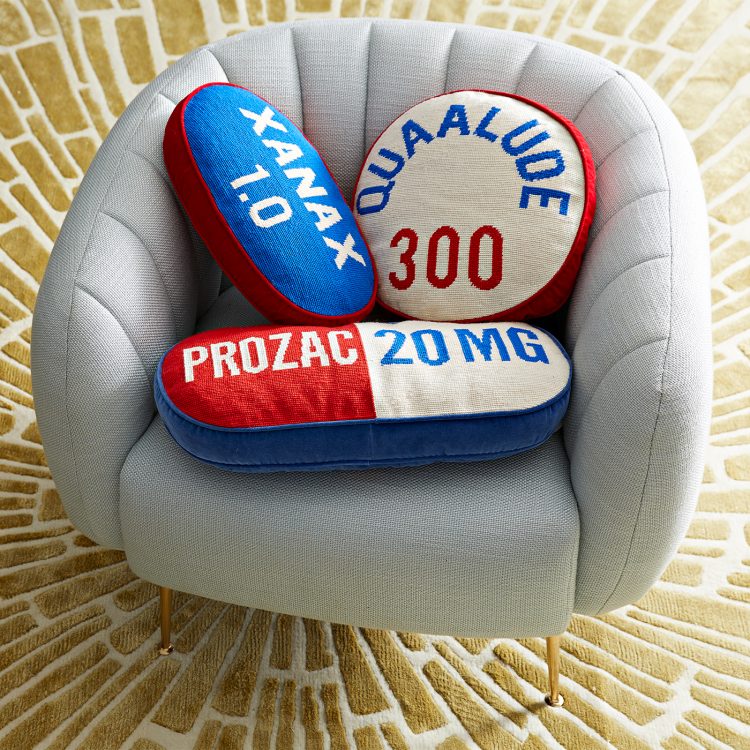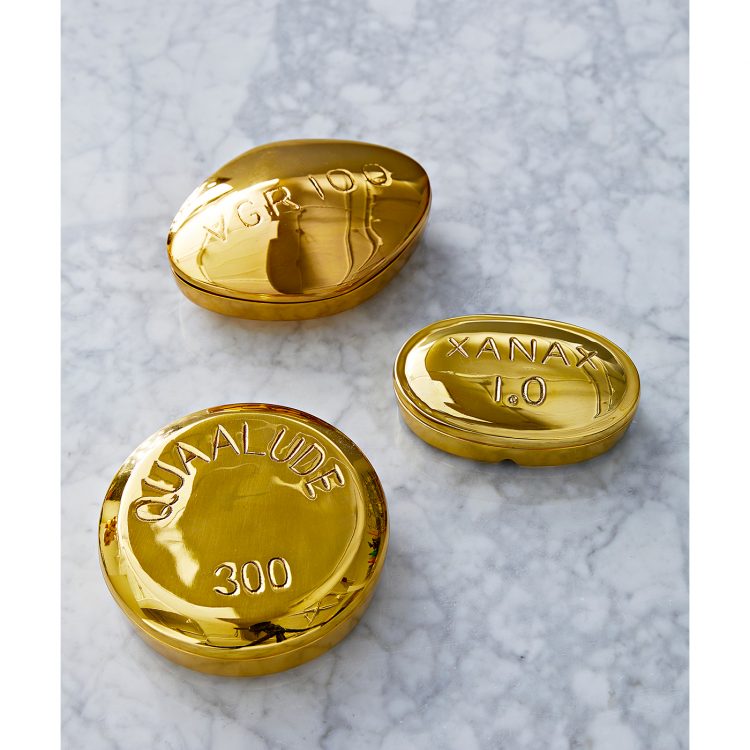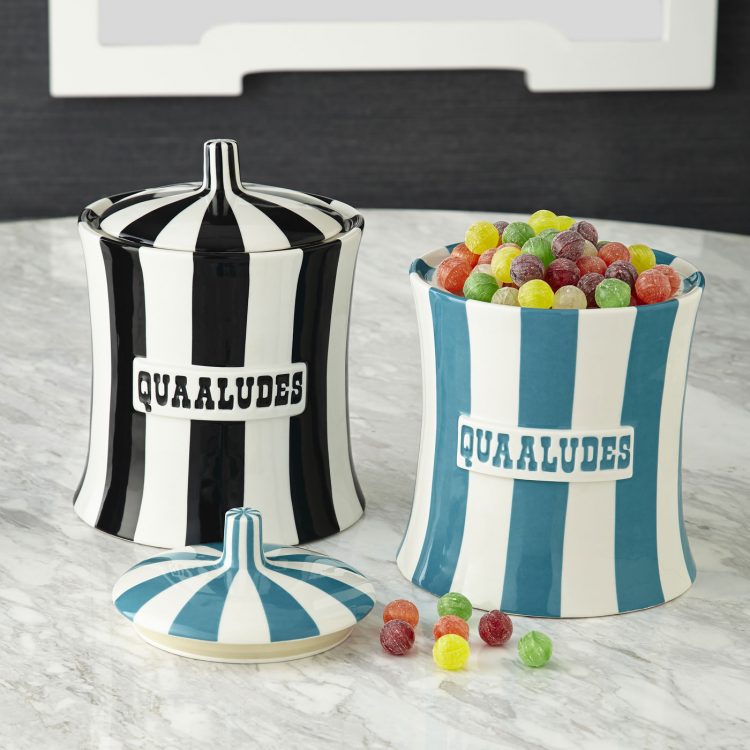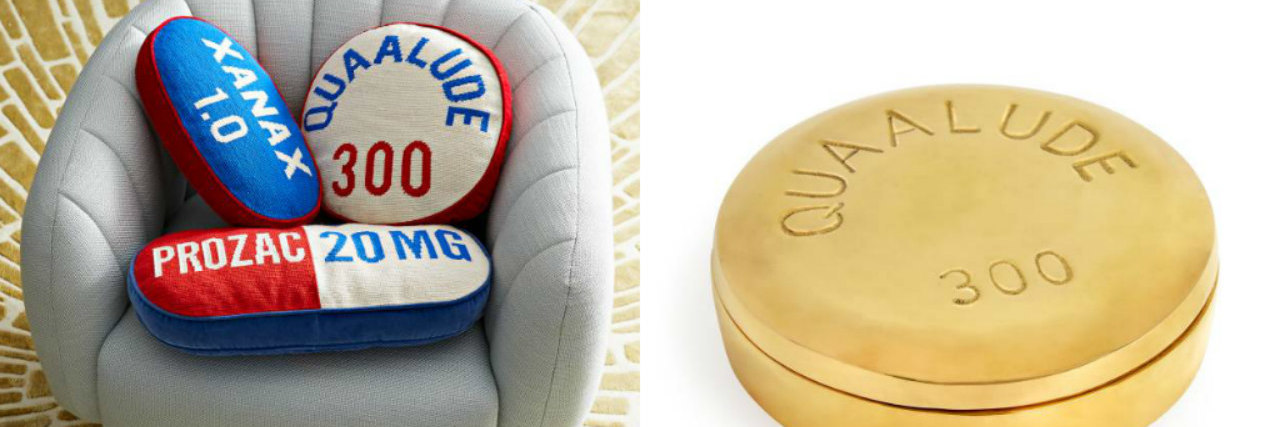This Prescription-Themed Home Decor Glamorizes Decades of Psychiatric Drug Abuse
Sometimes the news isn’t as straightforward as it’s made to seem. Juliette Virzi, The Mighty’s Associate Mental Health Editor, explains what to keep in mind if you see this topic or similar stories in your newsfeed. This is The Mighty Takeaway.
On Monday, interior designer Jonathan Adler was criticized on Instagram for glamorizing prescription drug abuse after posting a picture of pillows in the shape of Xanax, Prozac and Quaalude pills. The post has been removed from the high-end designer’s Instagram, but the pillows are still available for purchase online.

Though the Instagram post was the primary source of controversy, the brand’s “psychiatric” decor isn’t confined to just pillows. The Jonathan Adler website includes items like Quaalude candy canisters, giant decorative acrylic pills and brass Xanax, Quaalude and Prozac pill boxes — each with its own cringe-worthy product description. The stigma surrounding mental illness is real, and we cannot ignore the implications of products like these.
While some have suggested the collection “normalize[s] mental health,” any awareness it might raise is negated by the way it glamorizes prescription drug abuse. Displaying Quaaludes, an illegal drug, alongside legal prescriptions Xanax and Prozac implies these drugs are taken recreationally, and not for their intended mental health purposes.
Quaaludes were introduced in the U.S. in the 60s to treat insomnia and anxiety, but were soon widely misused because of their reputation for relaxing people so they could have “freer sex.” The drug is dangerous, and when combined with alcohol, has lethal consequences. Justin Gass, author of “Quaaludes (Drugs: The Straight Facts),” told BBC News that after consuming the drug with alcohol, it was common that, “People would lie down to go to sleep and just not wake up.” Because of its rampant abuse, the sedative pill was banned in the U.S. more than 30 years ago.
The price point of these products, which were designed for Jonathan Adler’s wealthy clientele, mirrors how Quaaludes were commonly prescribed and used by those with a higher income. Jonathan Adler’s brass Quaalude pillbox retails for $198 — a far cry from what the average pillbox costs. Using Quaaludes as part of the merchandise highlights this idea that mental health treatments are only for the wealthy when in reality, people of all classes struggle with mental illness. We need more access to mental health resources because taking care of your mental health should be a priority, not a luxury.

The company’s theme of recreational prescription drug use is echoed in other products as well as their descriptions. The Quaaludes canister is pictured full of candy, a clear homage to the epithet, “popping pills like candy.”
Meanwhile, the product description for the pillows suggests customers, “perk up [their] sofa with the right pharmaceuticals” and “take just one, or follow [the company’s] professional recommendation to mix the whole assortment” — implying these drugs can be mixed and matched on a whim.

The collection also romanticizes prescription drugs, advertising enamel tabletop items in an Instagram post with the caption, “Express your hedonistic side with our new Full Dose collection.”
Hedonism, the act of devoting one’s life to pleasure, isn’t the way we should be characterizing prescription medication. Taking psychiatric medication as prescribed isn’t about prioritizing “pleasure,” it’s about providing some relief from debilitating symptoms of mental illness.
This is something Mighty contributor Erica Chau wrote about in her piece, “We Need to Stop Thinking Antidepressants Are ‘Magic Pills.’”
Let’s get something clear. Antidepressants are not “magic pills” you take to magically make you a happy, dancing unicorn… They usually don’t make you happy and chippy, they usually don’t make you feel like you could take on the world and cook gourmet food. You usually don’t magically have pep in your step. But what they can do though, is allow you to live a better-adjusted life.
Not everyone felt the pillows glamorized prescription drug abuse. Before the Instagram post was removed, one commenter said, “As someone who takes an antidepressant and has had dependency issues with xanax in the past, I think these pillows are funny and irreverent,” Metro reported.
And being “irreverent” — or lacking proper respect or seriousness — is something the company strives for. In the company’s manifesto, it states: “We believe in irreverent luxury.” While some may argue this line of “psychiatric” merchandise perfectly encapsulates “irreverent luxury,” the reality is for many people with mental illness, taking psychiatric medication is not a luxury — it’s a necessity.
When we see news like this, we may be tempted to shrug our shoulders and think, “It’s pillows, not real pills. What’s the big deal?” But these products have consequences when they make mental illness and treatment look gimmicky as opposed to a real struggle millions face. And it’s not just Jonathan Adler that has created merchandise like this. Last year, Moschino drew criticism for a line of clothing dubbed the “capsule collection.” People have continued to voice their concerns about products promoting the abuse of pills — and it’s time we listened.
You can design products for people with mental illnesses, but it’s important to take the community’s history and stigma into account. When Carrie Fisher passed away, she had her remains placed in an urn that was in the shape of a Prozac pill. This was something the mental health community appreciated because it fit the narrative of her life as a mental health advocate and someone who struggled with mental illness.
There’s a fine line between normalizing mental health and making it trendy to turn a profit. If you want to talk about psychiatric medication and mental illness, do it in a way that respects the community. Otherwise, you’re just adding to the stigma so many have worked to negate. Let’s stop making mental illness a trend or a money-making scheme and start helping those who are struggling instead.
The Mighty reached out to Jonathan Adler for a comment on the controversy, but the company has not replied.
If you or someone you know needs help, visit our suicide prevention resources page.
If you need support right now, call the National Suicide Prevention Lifeline at 1-800-273-8255 or text “START” to 741-741.
Lead image via johnathanadler.com

